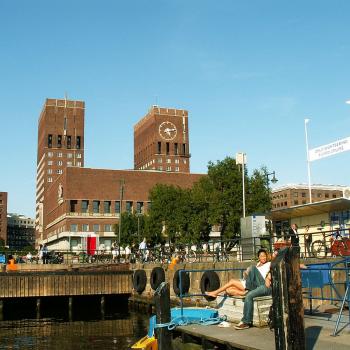One more thing. Religion in the home and in life was always also mapped onto finance: certainly in the Syrian world, but even in the person of my father, who’d raised himself up from the abject poverty in which he was raised (his father died when my Dad was eighteen; he’d been a garbage man and fruit seller in Seattle’s Pike Place market, which has a rather storied if somewhat forgotten Sephardic history) to the relative prosperity in which I was raised, even if by Syrian standards we struggled to keep up with the necessary set of luxury cars and double (triple!) mortgages and private school education and so on
- How would you describe the relationship between the “religious” and the “secular” in your community?
There is an overlap between the way that the Catholic world you address here on your blog conceives of itself against or within the larger “secular” world and the way the Syrian Community I was raised in sees itself likewise as a religious microcosm of a larger America beyond. Certainly there is a bias for Syrians > “everything else,” which is to say that a sort of necessary if fatally false dichotomy between Syrian lives and the lives we occasionally bump against (the 711 teller, the Manhattan doorman, the synagogue janitor from Haiti to whom money is sent in the wake of news of a disaster in his home country, as if he were the sworn emissary of that half-island that most Syrians, in their vacation sojourns in Aruba, have been near enough to see in the turquoise distance of the Caribbean, whether beyond the fizz of the shoreline or through the regal windows of first class airplane seats—and so on). Reference will invariably be made to the way we do something, and the way they do; these somethings often being, if not labelled as a conflict between religious and secular life, involving the same dynamics of those two. But the Syrian way is also so bound up with the other bits of that triangle: coming home for the holidays—for Rosh Hashana, Yom Kippur, and Sukkot, for example, the sum total of which can often crowd out the entire month of October, which is as you and all students know when the fall semester’s classes begin to hit their swing and the missing of which, consequently, can often leave even the student who has received the appropriate permissions at a complete loss to catch up for the coming exams—is as much about family as it is religion. A brilliant Ashkenazi friend of mine who, bless him, is more observant than I have ever in my adult life succeeded to be, would righteously observe rabbinic injunctions against electricity and writing on the holidays—but crucially, he would not come home, whereas I would, I would have to, there would be no choice in the matter—were I even to suggest otherwise to my poor mother she would doubtless feel a sensation as foreign as that experienced by desert flora and fauna when, having adapted majestically to an ecosphere bereft of any water, they forget the tingling taste of rain being observed by their cactus spines or their spiked scorpion backs. A Syrian mother or father might say, as mine have, that they were more Syrian than Jewish; which is to say nothing at all about an affiliation with a country called Syria so much as a Community, a metastasis of institutions social economic and cultural, founded and established and spread in a country not called Syria by those who when referring to whence they’d come referred to that country called Syria that they had never seen, but the imagination of which informed every aspect of their collective and individual imagination. Money, at the other end of the triangle, has its role, too: Syrians are expected to send their kids to expensive Jewish day schools—some of which, especially in the year-round Jersey contingent, were once entirely occupied and ruled by Ashkenazim. Not that this would matter: my father berated the several thousand dollar yeshiva education I received (pre-K to 12th grade) throughout my childhood—the rabbis were dumb, they were Ashkenazi or Ashkenazified, there was no proper teaching of liturgy, no one bothered to memorize entire tracts of the Bible like they had “in the old way”—but, when I finally graduated and said to him, with all the irony in the world, “congratulations, you spent a small GDP so that I could be in the same building with other Syrians (that is, Syrian Jews) for 12+ years.” And he didn’t quite smile but didn’t frown either when he said, as I expected he would, “yeah, that’s right.” Most “ordinary” (that is, not especially Ashkenazified, nominally white-hat, tax-despising businessmen) Syrians conceive of themselves as American in the sense of events in that world, America, having effects faint and fatal on “our” enclave; some of them vote, some even join municipal councils. We listen to American music, dance like Americans—grinding boys and girls at bar-mitzvah parties so sexualized as to be indistinguishable from modest orgies or speed-inflected raves—we speak English, mostly: our enclave is not the Williamsburg of Yiddish-speaking Hasidim. Our accent is mid-Atlantic; our suburban homes McPalaces; our uniform, too, a sort of American business casual. But then there is some unquantifiable difference common to all Syrians that, like a muscle we almost didn’t know we had, our bodily immersion in Syrian Community Credo is so fundamental as to snap back when we might not expect it of ourselves, thinking as we like to do that we are not the ultra-Orthodox you see on TV, that we are not the black-hats shuckling and moaning over the East River near empty lofts that will someday house a new location for Urban Outfitters. When a young Syrian is sent, as we increasingly are in recent years, our wealth being no longer so easily retained over generations, and our multi-generational wholesale businesses no longer surviving intact their being inherited from father to son, on the sort of Rumspringa of American university—even if that university is as tamely pro-Israel as Baruch or some other CUNY—we their Syrian parents worry desperately (if without quite articulating the unthinkable to ourselves) what might happen if they were to dare, as none of them will even think of doing, seriously engage beyond their bedrooms and even think of marrying one or another among the many young gentiles. That worry being made reality—and again, it must be emphasized that this does not happen, not the least because it is so absolutely unimaginable to most of us—that worry being realized and occurring to us in the actual, it is typical of Syrians that we will then find ourselves unknowingly snapped back into the sort of enclave-minded tribalism we usually distance ourselves from, saying we are not “typically” Syrians (no one is! everyone is!), that we are not “like J-dubs” (our slur for Ashkenazim), and to our lucky-in-love offspring who has violated the very core of our being we will scream and cry with such fury and horror that even those condemned to eternal damnation will not have heard suffering so primal. Case in point: the current chief Rabbi, some decades before he was indicted and narrowly avoided prison for money laundering, had a daughter who married a non-Jew. He mourned her, like she was dead, for seven intense days of shiva, then thirty lesser days of beard-growing and party-avoiding, then a whole year of Kaddish-reciting thrice daily, and all these according to the fullest extent of the laws of Moses and Israel.













